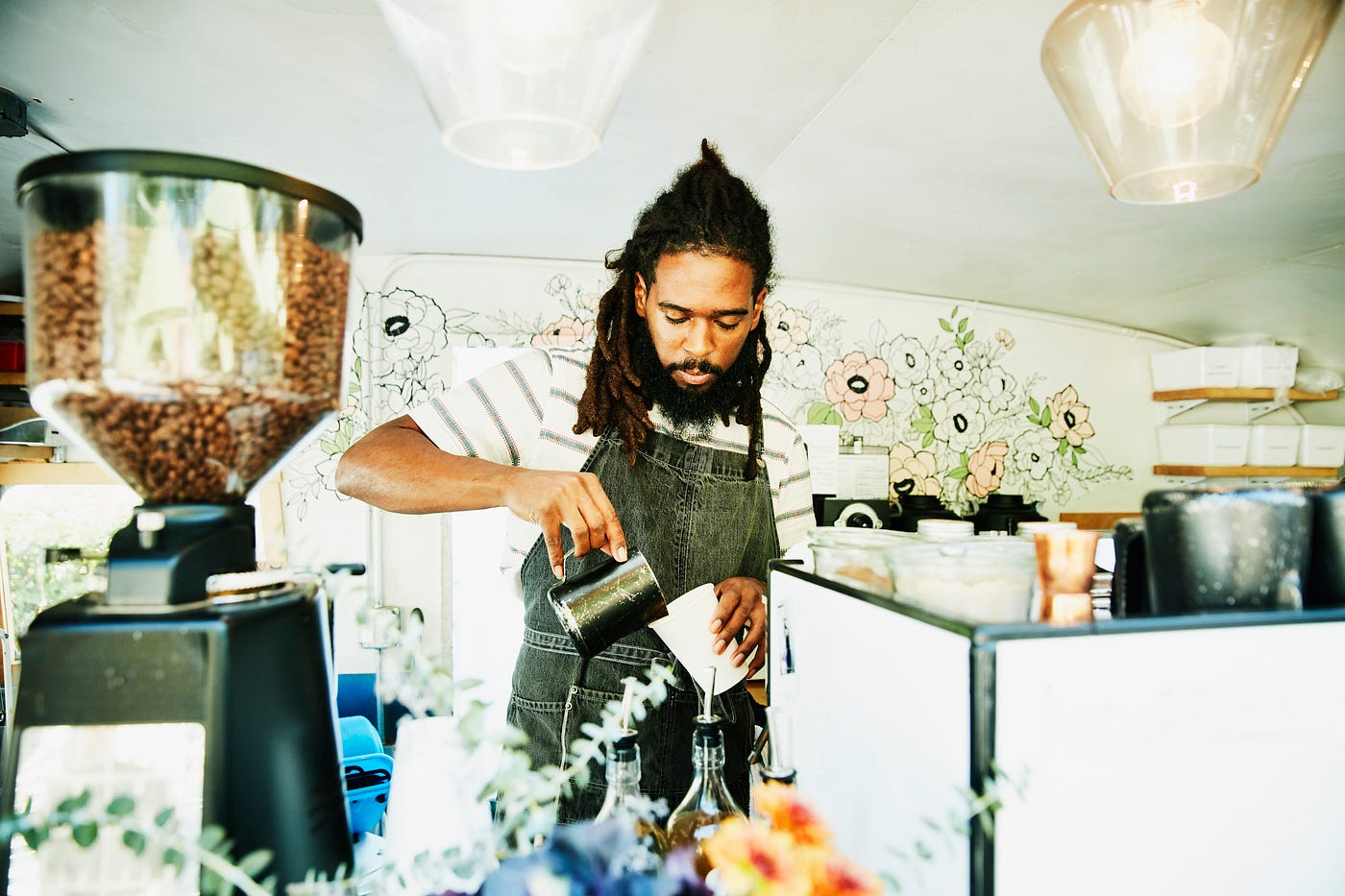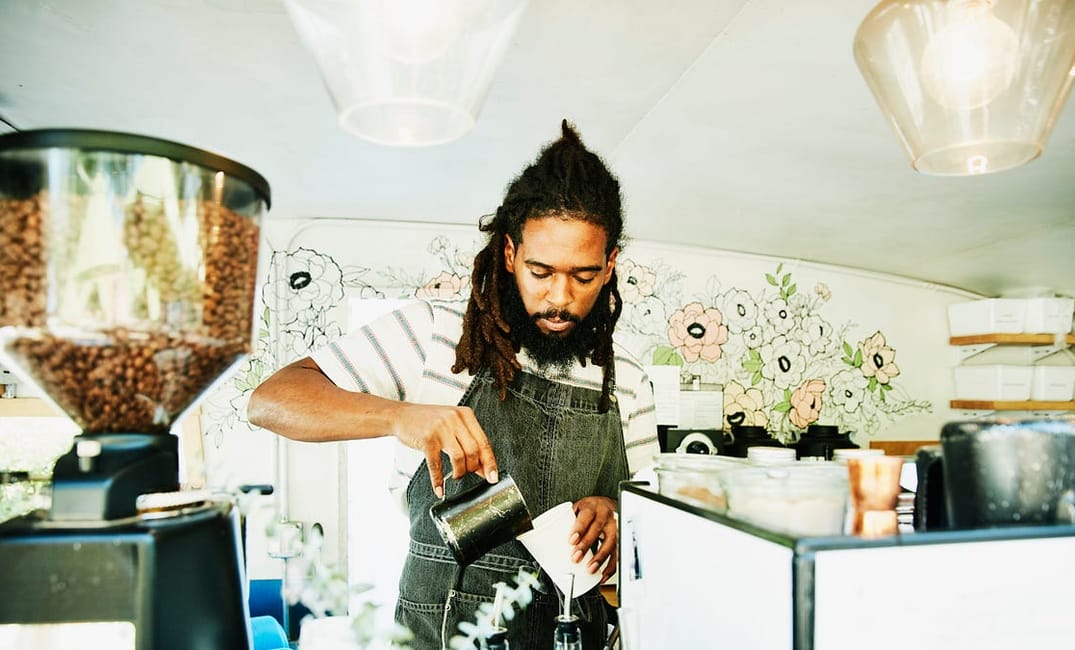
It’s like that movie Inception. One moment you’re moving along, doing your thing, and suddenly the ground opens up, flips upside down and sideways three times, and you have a whole new reality laid out in front of you to navigate. That’s what running a business this year has been like, and though we’ve somehow made it work at my two cafés—one on Union Street in San Francisco and another on Shattuck Avenue in Berkeley—this time has unearthed a lot about how different businesses are operating.
The industry I know best is specialty coffee, having been an industry thought leader and frequent critic through most of my 20-year career. Some cafés have stayed open through the entire pandemic, some have closed, and many are trying to figure out how to reopen. Just as we as an industry started thinking about Stage 2 or Stage 2.5 of reopening, George Floyd was murdered and our nation exploded in protest.
Sign up for The Bold Italic newsletter to get the best of the Bay Area in your inbox every week.
Suddenly, it was like this giant spotlight appeared, shining so brightly that it forced everyone to finally see how racist our country is. As things have progressed, it’s become clear that it wasn’t so much a spotlight as it was that we’ve finally opened our eyes to see all the racism, which has brought other issues into vision as well.
It wasn’t directly the news of Floyd’s killing. It wasn’t even the ensuing protests that triggered a deluge of criticism aimed at companies. It was the #BlackoutTuesday Instagram trend that seemingly every single brand and business participated in that caused people to come forward with stories of racist treatment and unresolved issues at and within businesses that were publicly claiming to support Black Lives Matter. It all amounted to egregious hypocrisy and whitewashing of these companies’ histories of racism and discrimination.
In the coffee community, some of these companies have reacted by simply disabling comments on their Instagram posts. Many have issued statements of apology with promises to try to do better moving forward, alongside vague commitments to reexamine their practices and donations to organizations for racial justice. I mean, c’mon, right now the absolute biggest trend in American business is posting a bullet-pointed list of How We’ll Be Better.
As the pandemic rolls on, and since the first shelter-in-place orders hit the Bay Area, cafés have responded in different ways around taking care of and communicating with their employees. In many cases, they’ve fired or laid off staff because of a lack of adequate Covid-19 protections, or the company has a history of racism or mistreating employees.
So far, our Wrecking Ball shops — which have remained open with precautions throughout this time — are surviving the pandemic, and sales are pretty much back up to pre-pandemic numbers. I believe it’s because we’ve stuck to our priorities and because our entire team has been on the same page, committed to making things work. Now, in the midst of coffee businesses being called out for racism and employee mistreatment all over the place, I find myself feeling fortunate — but “fortunate” isn’t really the right word — as we’ve been very public for years about how the main focus in our work is actually social justice and making diversity, inclusion, and equity not just a “core value,” but our priority.
I took the extra step last month to invite call-outs or complaints on our Instagram. I believe that if a business truly cares about being anti-racist, we should actively work to get feedback, and if that includes something we’ve done that failed to support our public statements, we should know and acknowledge that. You can either show that you’re afraid of being called out for racism or you can be anti-racist — you can’t be both. To date, we’ve had no responses to our invitation. Hopefully it’s because our vigilance has earned none. But I’m open to continual feedback.
As reopening stages are moving forward, specialty coffee is coming back, and you’ll again have your pick of cafés to choose from for your daily hot or iced beverage. But while we’re all seeing so much change happening in our country, and as white people increasingly believe Black and Brown people about how much racism exists in our communities, what about your café choices? Will you revert to what’s easy and convenient and dependent on maintaining ignorance or turning away in denial? Or will you do a personal audit of your consumption habits, using your consumer choices to make a statement in support of what you claim to believe in?
Since so many folks seem to love bullet-pointed lists right now, here are some things to consider as we start venturing out to reacquaint ourselves to life around the city:
- Check out the company’s social media accounts—especially Instagram and Twitter—and see if complaints have been recently posted about it. If comments are turned off for recent posts, that’s a big red flag.
- Find out who the owners and management are. Do you see racial and gender diversity there?
- What is the company’s proximity to and relationship with Black people? Does it have Black employees, especially in management roles? Does it serve the Black community? Is it a gentrifying presence in what is or was a significantly non-white neighborhood?
- Is the café set up for employee health and safety? Ask the employees if they feel that their employers have prioritized their health and safety from Covid-19.
- Coffee companies tend to want to look progressive. How much of what these companies put out there on social media is about putting their brand on the line to speak up for social justice, and how much could be seen as just pandering?
- When you visit a café, ask the baristas some questions about the company and how it has treated employees during the health crisis and shelter in place. Ask them how the company has been when it comes to POC, especially Black people. Do you see Black people working there? If not, ask them if Black people work there.
- Coffee companies love to portray themselves as white saviors of the Black and Brown communities that grow and produce their coffees. Is this company crossing the line there and doing anything exploitative for the sake of marketing and PR?
- Even if it’s about a different coffee company than the one you’re at, ask the baristas what they’ve heard about your favorite cafés. Ask the baristas, because the baristas know.
Make no mistake, my company is not perfect, and I wouldn’t be able to respond to everything on this list in a way I’d be 100% happy with. But my personal ethos is that “doing good” is only truly meaningful if it represents some amount of challenge and sacrifice. Every business category and industry could have a similar list of ways to audit our consumption habits, so I encourage you to consider and reconsider where you choose to spend your money.
We’ve hopefully all learned by now that believing Black lives matter means we can’t just be not-racist—we need to be anti-racist. The fact is that we can’t just say we’re anti-racist without putting in some work, probably including making some choices that are less convenient, less yummy, and less Instagrammable than what we were doing before.
Read more like this:







